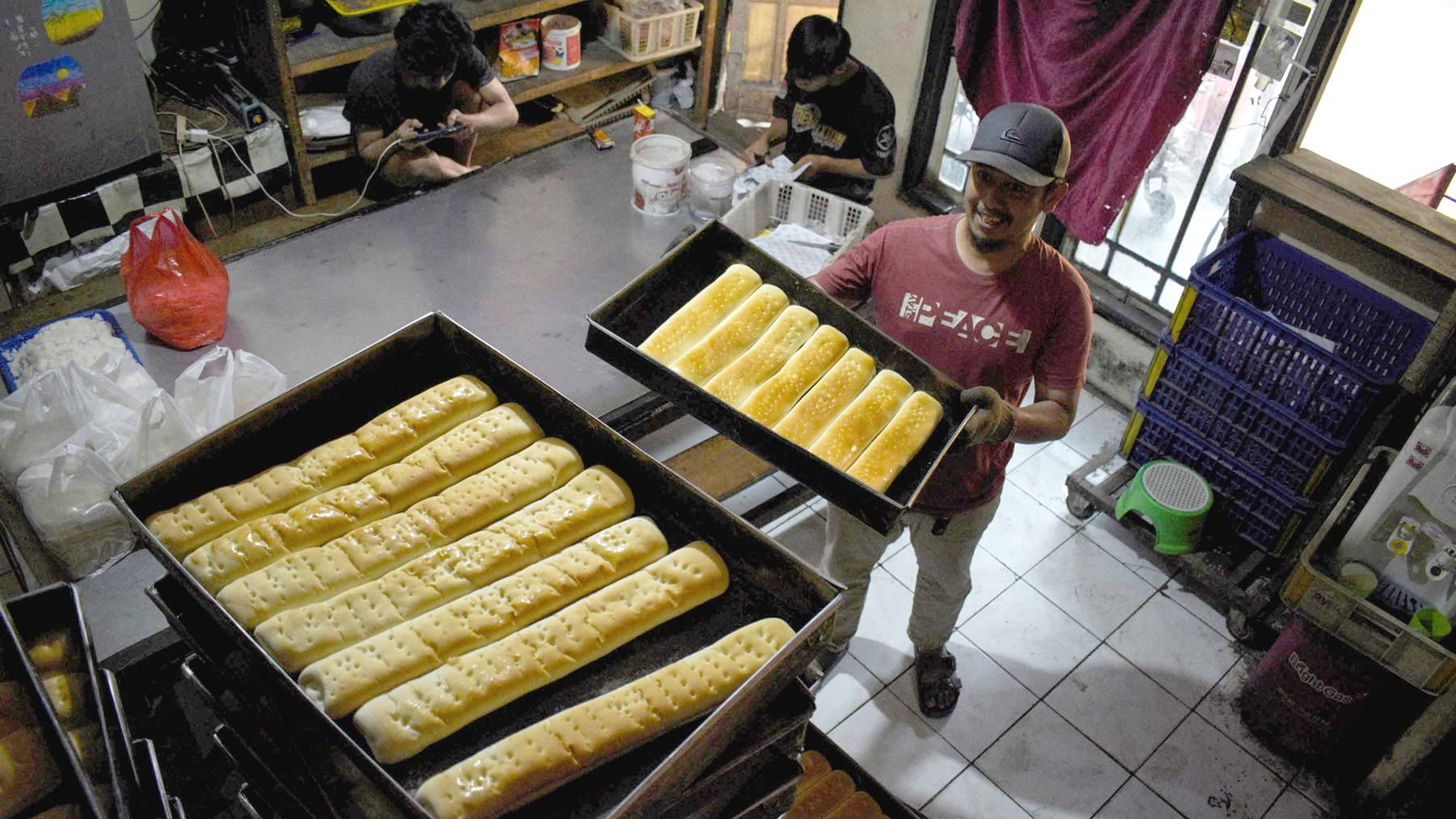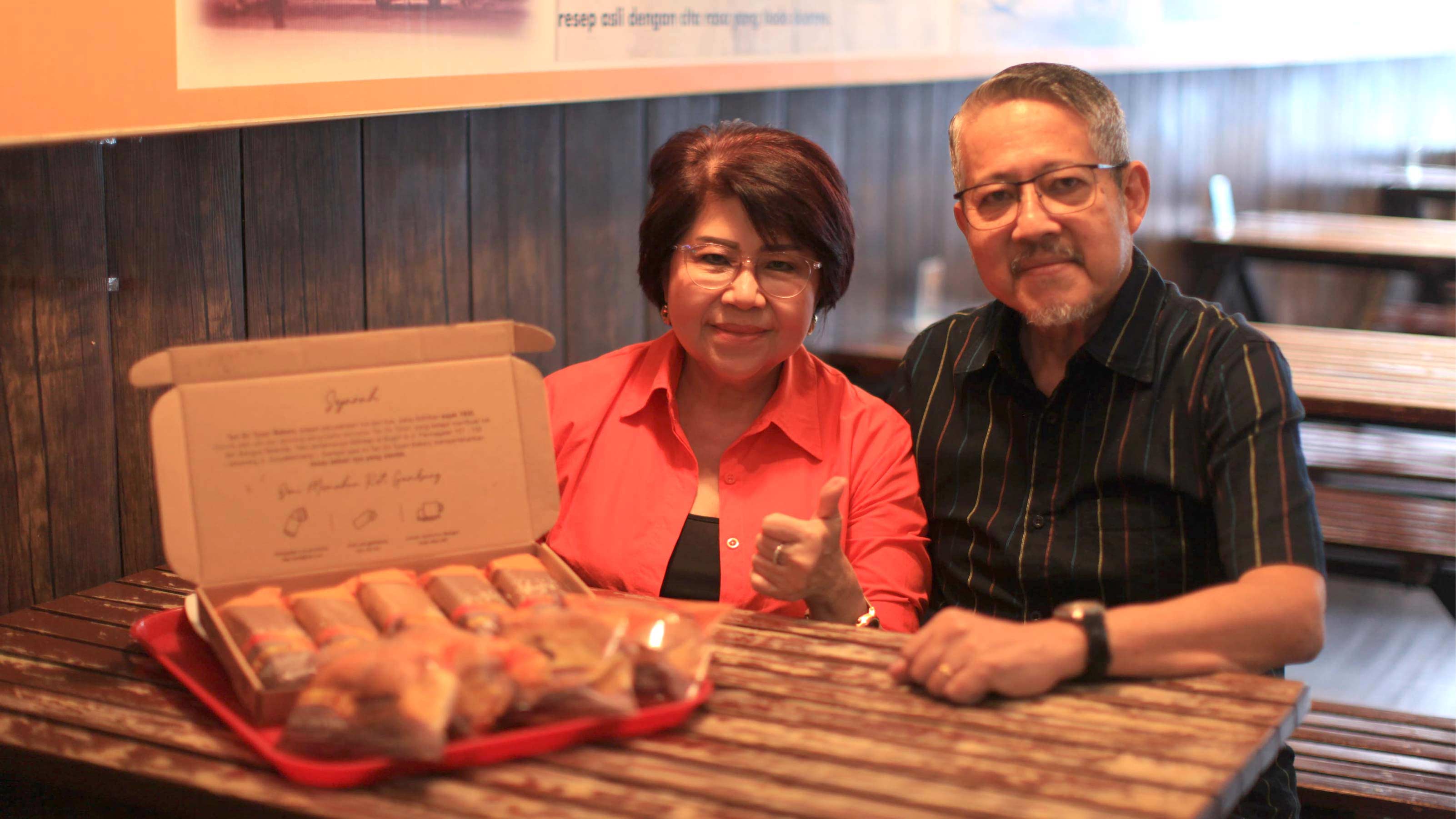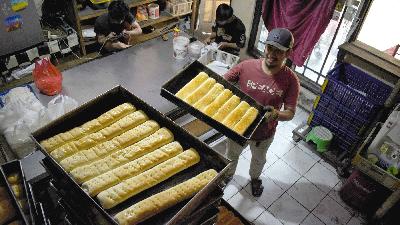Home-Baked Bread Business Competes with Manufactured Breads
Monday, July 22, 2024
The presence of Okko and Aoka disturbs home-industry breads produced by micro, small and medium businesses.
arsip tempo : 174725579611.

SUTARNO, alias Nano, took out six trays of elongated bread from an oven fueled with a 3-kilogram gas cylinder. The breads already filled with grated coconut were cooled down for three hours on rectangular trays before being sliced and put into clear plastic bags measuring 11 x 25 centimeters. Two workers then sealed the tips of the plastic bags and attached paper labels with the words “Roti Kopyor Sawargi Rp 3,000.”
This has been Nano’s daily routine as a bread maker in Gang Babakan Rahayu, Bojongloa Kaler, Bandung Regency, West Java. On Thursday, July 18, the 41-year-old man began his day at 7am and continued until 5pm. He started by preparing trays in the morning; making dough from flour, yeast, water, salt, improver, butter, sugar, and preservatives; and ended by packaging and delivering the bread to customers at night.
Dozens of residents in Gang Babakan Rahayu—a bread production center in Bandung—engage in similar activities. Along the roughly 100-meter-long alley, the scent of bread wafts from residents’ homes. Carts and motorcycles come and go, picking up packaged bread for sale.
Nano and his wife, Lia Muliawati, 36, started their bread business in February 2012 under the brand Putri Sawargi. They invested Rp11 million (around US$680) in equipment and raw materials. This homemade bread business is a branch of the business of Lia’s parents, who established the Sawargi brand in 1987. Located in the same alley, their operations are just 10 meters apart. They neighbor other bread makers with brands like Mekar Sari 99 and Kurnia.

Third generation owner of Tan Ek Tjoan, Lydia Cynthia Elia (left) with husband Hadi D Setiawan at their shop on Jalan Siliwangi, Bogor, July 18. TEMPO/MA Murtadho
According to Nano, there are about 30 bread makers in Gang Babakan Rahayu. Before the Covid-19 pandemic, there were 40 houses involved in the bread business. Now, Nano and his wife only produce kopyor (soft coconut) bread with a capacity equivalent to three sacks of wheat flour. They sell their bread for Rp3,000 (US$0.18) per pack. “The size is now smaller, half of what it used to be,” Nano told Tempo.
Apart from the pandemic, one of the reasons for the decline in bread production in Babakan Rahayu is the increasing business competition. The traditional homemade bread from Babakan Rahayu is overwhelmed by factory-made bread sold at the same price range. Okko and Aoka are two brands that directly compete with products from Gang Babakan Rahayu as they are also sold in traditional markets and stalls. “Bread of that class should be sold in minimarkets. With good packaging, soft texture, and longer shelf life, we are clearly being sidelined by those with advanced technology and capital,” said Nano.
After the end of the pandemic, the popularity of Okko and Aoka surged further, especially since both offer an unusually long shelf life for bread products, lasting up to three months from the production date. Nano and other bread producers in Babakan Rahayu use common preservatives like calcium propionate, with a maximum of 4 grams per kilogram of flour, which according to Nano, complies with the standards of the Food and Drug Monitoring Agency (BPOM). “The bread’s shelf life is only up to five days,” he explained.
Due to the massive influx of factory-made bread, wholesale buyers in the Babakan Rahayu bread center have begun shifting to brands like Aoka and Okko. Ironically, Nano added, trucks carrying these factory-made breads often park in front of Gang Babakan Rahayu. “They drop loads of one to two containers. Buyers from Subang, Tasikmalaya, Garut, and Cianjur used to buy our bread, but now they’ve switched,” he said. This competition, Nano revealed, has caused unrest among homemade bread producers who feel that the strategies of large-scale bread factories are unfair.
To remain competitive, Nano has been gathering additional capital to purchase modern packaging equipment and bread molding machines to speed up the production process and increase output. To expand his market reach, Nano utilizes social media. In a day, he produces 1,140 packages of kopyor bread and earns a net profit of Rp5 million (US$309) per month. “Previously, profits could reach Rp11 million (US$680) per month.”
Compared to Okko or Aoka, Nano’s production scale is very small. Okko, under Abadi Rasa Food, produces 30,000 packages per day. The manager of the Okko bread factory, Jimmy, said their products are distributed across Java, especially West Java. The selling price in Bandung and its surroundings is set at Rp2,500 (US$0.15), while in Jakarta it is Rp3,000 per package. “We want to make delicious bread at a low price for the middle to lower class,” he told Tempo on Wednesday, July 17. Meanwhile, according to Kemas Ahmad Yani, Head of Legal Affairs of Indonesia Bakery Family, Aoka’s 16 bread variants have spread throughout Indonesia.
However, not all homemade bread producers are intimidated by factory-made food products. Some legendary bread brands still survive with the same production and sales processes they have had for decades. One such example is Tan Ek Tjoan bread, established in 1920. The business started because Dutch nobles had difficulty finding bread, which was a staple in their diet. A Chinese-Indonesian businesswoman, Phoa Kie Nio, opened a bread factory based on the knowledge and experience she gained from the Dutch.
Phoa then opened a homemade bread shop under the brand Tan Ek Tjoan, named after her husband. Today, Tan Ek Tjoan is a legendary bread brand sold in Jakarta and its surrounding areas. Initially, Phoa and her husband, who worked as ice vendors, sold bread at Jalan Perniagaan (now Jalan Suryakencana) No. 159, Central Bogor, Bogor City, West Java. As the brand grew, the second generation of the company, led by Tan Bok Nio, opened a store on Jalan Siliwangi No. 176, South Bogor, Bogor, in 1974.
After Tan Bok Nio passed away in 1992, the Tan Ek Tjoan bread business was managed by her children, including Lydia Cynthia Elia, who continues the business with her husband, Hadi D. Setiawan. Lydia explained that Tan Ek Tjoan only has one store on Jalan Siliwangi and one outlet at Taman Mini Indonesia Indah in Jakarta. She stated that marketing outside Bogor is done by partners using mobile carts painted yellow and brown, representing wheat and soil. In Jakarta, these bread carts are commonly found in areas like Menteng, Cikini, and Rawamangun. Currently, Tan Ek Tjoan has 100 mobile cart bread selling partners.
Tan Ek Tjoan produces various kinds of bread, such as white bread, gambang (wooden-bar-shaped) bread, and chocolate bread. “We also innovate according to consumer needs,” Lydia told Tempo on Thursday, July 18. Tan Ek Tjoan bread is priced between Rp8,000 (US$0.49) and tens of thousands of rupiah, depending on the flavor and size. To maintain quality, Lydia said the production process is still carried out daily on a home-based scale, using only Indonesian ingredients. The amount of production depends on orders from partners, handled by 15 employees.
Hadi Setiawan stated that the bread market competition is getting tougher, so business players must be smart in targeting their market segment and maintaining consumer loyalty. “Tan Ek Tjoan targets residential markets, (we) don’t enter retail, and we aren’t consigned to small shops,” he said.











